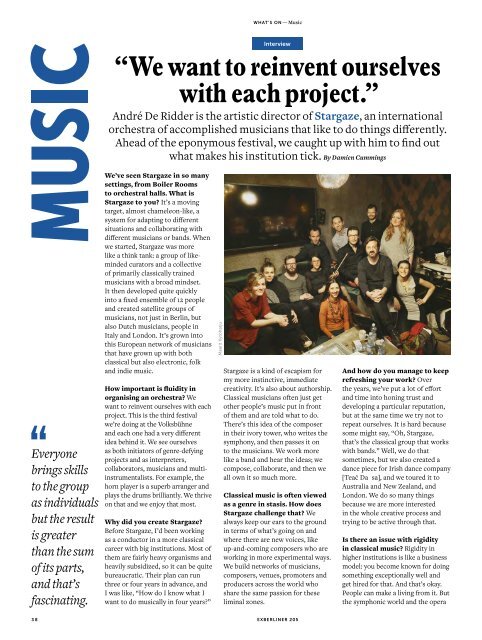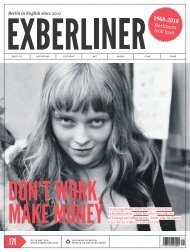EXB-205_Web
From test-driving delivery gigs to scoring work with corona and delving into the Nazi history of modern management, it’s all in a day’s work for Exberliner. Our latest issue explores jobs and jobbing in the city. FREE TO OBEY – A historian explains how an SS Oberführer shaped modern management THE CORONA GIG – A new job market grows out of testing and vaccinating – but how long will it last? COVID CAREER SHIFTS – Four hustlers find themselves at a professional crossroads SECURE IN THE SADDLE – Exberliner takes delivery app employers on a test drive “I’M A RIDER MYSELF!” – Gorillas start-up founder Kağan Sümer on how it all began COWORKING GOES CORPORATE – How big brands are warming to the idea of sharing an office THE HOMEOFFICE DEBATE – As the novelty wears off, we hear four different takes on working from home POLITICAL NOTEBOOK – Business as usual with Israel BEST OF BERLIN – A fashion Plattenbau, wine in a can and home-cooked grub to order BOOKS – The absurdity of Heimat, East German diaries and paperback picks BERLIN BITES – Four puffy-crusted gems of the pizza-demic SHORT ESCAPES – Venturing out to the sandy shores of the Müritz
From test-driving delivery gigs to scoring work with corona and delving into the Nazi history of modern management, it’s all in a day’s work for Exberliner. Our latest issue explores jobs and jobbing in the city.
FREE TO OBEY – A historian explains how an SS Oberführer shaped modern management
THE CORONA GIG – A new job market grows out of testing and vaccinating – but how long will it last?
COVID CAREER SHIFTS – Four hustlers find themselves at a professional crossroads
SECURE IN THE SADDLE – Exberliner takes delivery app employers on a test drive
“I’M A RIDER MYSELF!” – Gorillas start-up founder Kağan Sümer on how it all began
COWORKING GOES CORPORATE – How big brands are warming to the idea of sharing an office
THE HOMEOFFICE DEBATE – As the novelty wears off, we hear four different takes on working from home
POLITICAL NOTEBOOK – Business as usual with Israel
BEST OF BERLIN – A fashion Plattenbau, wine in a can and home-cooked grub to order
BOOKS – The absurdity of Heimat, East German diaries and paperback picks
BERLIN BITES – Four puffy-crusted gems of the pizza-demic
SHORT ESCAPES – Venturing out to the sandy shores of the Müritz
You also want an ePaper? Increase the reach of your titles
YUMPU automatically turns print PDFs into web optimized ePapers that Google loves.
WHAT’S ON — Music<br />
Interview<br />
“We want to reinvent ourselves<br />
with each project.”<br />
André De Ridder is the artistic director of Stargaze, an international<br />
orchestra of accomplished musicians that like to do things differently.<br />
Ahead of the eponymous festival, we caught up with him to find out<br />
what makes his institution tick. By Damien Cummings<br />
Everyone<br />
brings skills<br />
to the group<br />
as individuals<br />
but the result<br />
is greater<br />
than the sum<br />
of its parts,<br />
and that’s<br />
fascinating.<br />
We’ve seen Stargaze in so many<br />
settings, from Boiler Rooms<br />
to orchestral halls. What is<br />
Stargaze to you? It’s a moving<br />
target, almost chameleon-like, a<br />
system for adapting to different<br />
situations and collaborating with<br />
different musicians or bands. When<br />
we started, Stargaze was more<br />
like a think tank: a group of likeminded<br />
curators and a collective<br />
of primarily classically trained<br />
musicians with a broad mindset.<br />
It then developed quite quickly<br />
into a fixed ensemble of 12 people<br />
and created satellite groups of<br />
musicians, not just in Berlin, but<br />
also Dutch musicians, people in<br />
Italy and London. It’s grown into<br />
this European network of musicians<br />
that have grown up with both<br />
classical but also electronic, folk<br />
and indie music.<br />
How important is fluidity in<br />
organising an orchestra? We<br />
want to reinvent ourselves with each<br />
project. This is the third festival<br />
we’re doing at the Volksbühne<br />
and each one had a very different<br />
idea behind it. We see ourselves<br />
as both initiators of genre-defying<br />
projects and as interpreters,<br />
collaborators, musicians and multiinstrumentalists.<br />
For example, the<br />
horn player is a superb arranger and<br />
plays the drums brilliantly. We thrive<br />
on that and we enjoy that most.<br />
Why did you create Stargaze?<br />
Before Stargaze, I’d been working<br />
as a conductor in a more classical<br />
career with big institutions. Most of<br />
them are fairly heavy organisms and<br />
heavily subsidized, so it can be quite<br />
bureaucratic. Their plan can run<br />
three or four years in advance, and<br />
I was like, “How do I know what I<br />
want to do musically in four years?”<br />
Maarit Kytöharju<br />
Stargaze is a kind of escapism for<br />
my more instinctive, immediate<br />
creativity. It’s also about authorship.<br />
Classical musicians often just get<br />
other people’s music put in front<br />
of them and are told what to do.<br />
There’s this idea of the composer<br />
in their ivory tower, who writes the<br />
symphony, and then passes it on<br />
to the musicians. We work more<br />
like a band and hear the ideas; we<br />
compose, collaborate, and then we<br />
all own it so much more.<br />
Classical music is often viewed<br />
as a genre in stasis. How does<br />
Stargaze challenge that? We<br />
always keep our ears to the ground<br />
in terms of what’s going on and<br />
where there are new voices, like<br />
up-and-coming composers who are<br />
working in more experimental ways.<br />
We build networks of musicians,<br />
composers, venues, promoters and<br />
producers across the world who<br />
share the same passion for these<br />
liminal zones.<br />
And how do you manage to keep<br />
refreshing your work? Over<br />
the years, we’ve put a lot of effort<br />
and time into honing trust and<br />
developing a particular reputation,<br />
but at the same time we try not to<br />
repeat ourselves. It is hard because<br />
some might say, “Oh, Stargaze,<br />
that’s the classical group that works<br />
with bands.” Well, we do that<br />
sometimes, but we also created a<br />
dance piece for Irish dance company<br />
[Teaċ Daṁsa], and we toured it to<br />
Australia and New Zealand, and<br />
London. We do so many things<br />
because we are more interested<br />
in the whole creative process and<br />
trying to be active through that.<br />
Is there an issue with rigidity<br />
in classical music? Rigidity in<br />
higher institutions is like a business<br />
model: you become known for doing<br />
something exceptionally well and<br />
get hired for that. And that’s okay.<br />
People can make a living from it. But<br />
the symphonic world and the opera<br />
38<br />
<strong>EXB</strong>ERLINER <strong>205</strong>


















